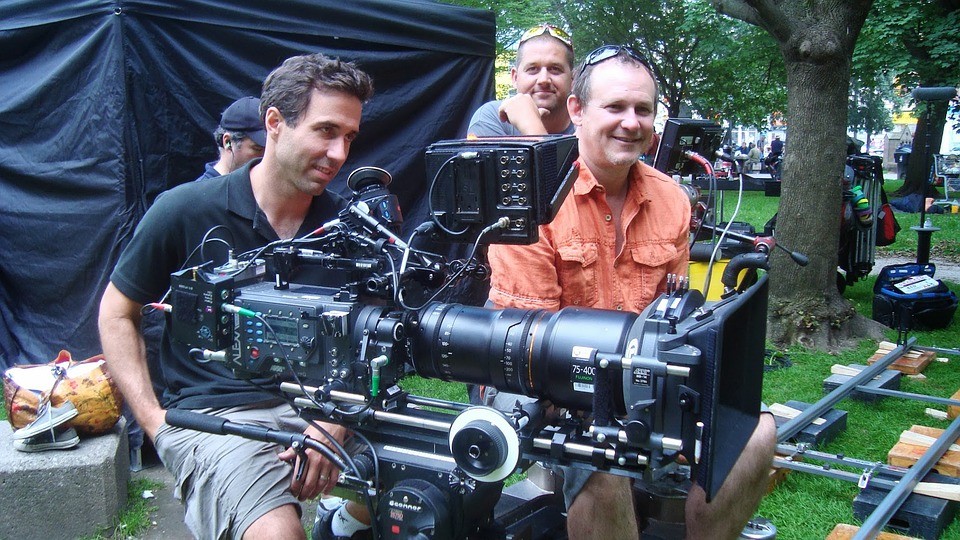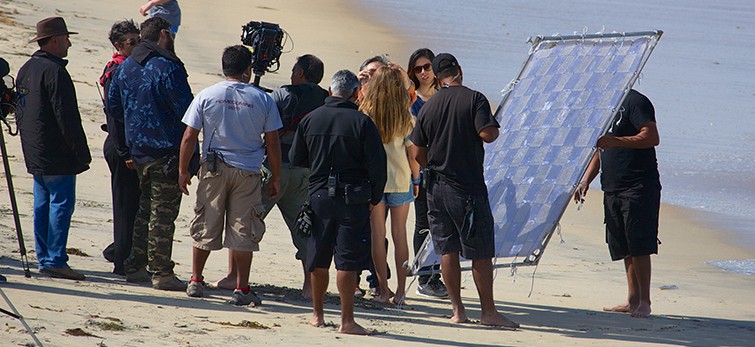Everything you need to know about Video Production.
The Camera Department
Welcome to our new series of articles about Video and Film Production crew. Whether you want to be in the industry, or just want to learn more about filmmaking, we will provide you with all the information you need right here. Today we are talking about the one and only, camera department.
The camera department is a great and fulfilling department to work in. Thinking about lighting, positioning and cinematography is a rewarding job, seeing a vision come to life and brings that extra layer of storytelling to screen.
Who comprises The Camera Department?
DoP – Director of Photography or Cinematographer
The key Head of Department in the camera department, their role is to provide a film with its unique visual identity and look. The DoP is the most creative role in the camera department. They work closely with the Director and Art Department to give a film its visual signature and mis-en-scene. Lighting is a key element in filmmaking, and the DoP is in charge of lighting and camera positioning.
The DoP discover the photographic heart of a screenplay, using source materials such as stills photography, painting, other films and talking to what the director also wants, etc.They talk to director and arrange what locations and shots will be used, making a shot list. They prepare a list of all required camera equipment, including lights, film stock, camera cranes, etc.
They test lenses, filters or film stock. In rehearsals and blocking (deciding the movements of both actors and camera). on smaller sets, the DoP will also operate the camera. And in Post Production, they are required to attend the digital grading of the film, they go through the rushes and decide with the Director which to use.
Camera Operator
The Camera Operator is in charge of holding the camera during the whole shooting process of the camera department. Many DoP’s prefer to also handle and direct the camera themselves. They’re responsible for capturing the different scenes during production and operating a wide range of technical equipment, including cranes, camera lenses, dollies, and mobile mountings. They assemble and set up all the camera equipment, plan and prepare scenes, choreograph and frame shots and also find appropriate camera lenses.
Camera Operating can be physically demanding and tiring as sometimes you will have to move heavy camera equipment around or even hold camera’s on shoulders, etc. The camera operator is in charge of operating some of the most expensive equipment on a set, so a thorough knowledge of the equipment and how to handle it is a must. Having a well-organised and skilled camera operator will make any camera production run smoothly.
Gaffer
The Gaffer works closely with the Director of Photography in the camera department. They are the Head of the electrical department and they work together to bring the visuals of the film by creating and controlling the lights. They make a list of all kit that will be needed. During shoots, they will be in charge of positioning the lights and quickly changing the setups between shots.
The Gaffer needs an artistic eye in order to find suitable and artistic lighting effects, they need good knowledge of electrics and good understanding of film-making and all other elements of the camera department
Spark
The spark, aka, the electrician, is in charge of looking after all of the electrical equipment on set, in particular the lighting and being the Gaffer’s assistant. They help plan, rig, operate, maintain and de-rig at the end of the day.
The Spark also assess the kit and makes sure all electrical equipment is working safely throughout the production. They test, clean and repair any equipment.
Grip
The Grip is the camera operators assistant. They are responsible for the equipment that supports the cameras, they work on how to position the camera, setting up and controlling Jibbs and Dollies. They help achieve smooth and continuous shots as the camera works.
1st AC
The 1st AC ( Camera Assistant or Focus Puller), is an important support position in the camera department. They have one main job and that is to be focus puller, they sit next to the camera during shooting and operate the len’s focusing ring in order to keep the right subject in focus throughout each scene.
1st ACing is considered one of the hardest job on a film set because they have to set and maintain the focus point during the whole take. They have to keep the focus on the subject while they move and walk around. The AC has to calculate exactly how much to pull the focus in order to keep the subject sharp in the focal plane. The 1st AC also has to be in charge of maintaining all the camera equipment, cleaning, setting up and taking down the camera each day. It is definitely the hardest job in the camera department.
2nd AC
The 2nd AC (Camera Assistant or the Clapper Loader), is also a very important support position in the camera department. They work the Clapper Board during shooting. They have to mark the clapper board and slate the beginning of each take, keeping footage organised for post production. On the slate, they keep information such as which roll they’re on, which scene and take they are on.
Basic Equipment:
-
Cameras
Filmmakers use anything from a camcorder, a mirrorless camera, DSLR or cinema cameras.
-
Lenses
Lenses are important to professional filmmaking and help bring light to a fixed focal point.\
-
Filters
Using filters is a great way to take more control over the images that are being shot.
-
Tripods
Stabilises the camera for a professional look.
-
Lighting
Many filmmakers nowadays use LED lights.
-
Reflectors
Reflectors are used to manipulate natural light for different purposes. Diffuse light / Fill light or block out light.
How to get into camera?
Many Camera Operators and AC’s start off as runners and then try and get roles as Sparks in order to get into the large roles of the camera department so that they can get more hand-on experience of cinematography and the skills needed to be a DOP.
Get An Eduction – Film School or College:
You can go to University or Film School to attain some skills in the camera department. You can study: Media, Filmmaking, Art & Design, or Photography. Take A-levels or Highers in a combination that includes art, art and design or graphic communication with maths and physics
Build a Portfolio:
Get on as many productions as you can! Big or small on a freelancing basis or as a volunteer, this helps you get a good portfolio together to send to employers, and or put on an official website to get recognition.
Work experience:
Try to get work experience by writing to local production companies and asking if they offer any. Keep an eye out for work experience opportunities at the BBC, Channel 4, Channel 5, ITV and Sky. An apprenticeship is a job with training, so it’s a great opportunity to earn while you learn. However, it can be challenging to find jobs as an apprentice with production companies as many are not able to take on people for a whole year, which is an apprenticeship requirement at the moment. But in England, there’s a Level 3 apprenticeship as a photographic assistant.
Network:
Get to know people in the industry by attending events. Meet professionals and ask them questions about their work, while demonstrating interest in and knowledge of the industry. Offer to provide them with your professional contact details and try to stay in touch with them. Go to how to network well to learn how to do this.
Network online:
Create a LinkedIn profile! Or join Facebook pages or social media pages for people working in the industry in your area! There might be lots of jobs for runners or trainees. Join them, the most important thing is to get yourself out there.
To get more information in becoming apart of the camera department, visit: Screenskills, How to get into sound. Go to ScreenSkills information on apprenticeships for the main apprenticeship schemes in television. learn how to build your sound portfolio.
As a video production company in London, we often get asked how much it would cost to produce a video ourselves. The truth is, with the right equipment and some know-how, you can save a lot of money by creating your own videos. Of course, there is an initial investment involved in purchasing the necessary equipment.
However, once you have your own set-up, the sky is the limit in terms of what you can create. And if you’re willing to put in the time to learn the ropes, you can start producing high-quality videos that will save you money in the long run. So if you’re looking to create video content on a budget, don’t be afraid to go DIY. With a little effort, you can create professional-grade videos that will help you save money and reach your target audience.

















Recent Comments